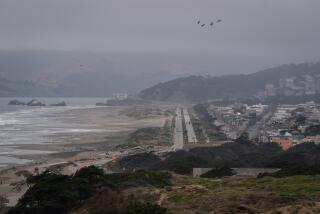Coastal commissioners face potentially huge fines under judge’s ruling
California coastal commissioners have a nearly impossible job given the agency’s lack of support for its volunteer board.
However, that doesn’t necessarily excuse five former and current members of the commission from potentially having to pay hundreds of thousands of dollars in fines under a 2016 lawsuit alleging that they hid private meetings with developers and other lobbyists from the public.
Those are the conclusions of a tentative ruling issued this weekend by San Diego Superior Court Judge Timothy Taylor, who is presiding over the legal battle.
“The court sincerely questions whether the mandates of the Coastal Act … can be efficiently carried out with transparency and participatory openness using a part-time, unpaid volunteer board that meets only three days a month at scattered locations,” Taylor wrote.
The California Coastal Commission took exception to the judge’s characterization and defended its practices as robust.
“Each new commissioner is provided with a binder with a section on what the statute requires and how to fill out and submit ex parte forms,” said agency spokeswoman Noaki Schwartz. “There have also been a number of public ex parte trainings at commission meetings in the past 10 years, which are recorded.”
Though it’s not illegal for commissioners to meet privately with interested parties ahead of a vote, they are required to disclose those ex parte communications within seven days.
The lawsuit, brought by the nonprofit Spotlight on Coastal Corruption, alleges that commissioners failed to properly report more than 200 meetings — either doing so late, without sufficient detail or, in two cases, not at all.
The California attorney general’s office — representing former commissioners Steve Kinsey, Martha McClure and Wendy Mitchell, as well as commissioners Erik Howell and Mark Vargas — has argued that the purported violations are overblown and amount to little more than clerical errors.
Gary Winuk, a private attorney for Mitchell, said the ruling validated his client’s position that any reporting issues were unintentional and merely the result of unclear guidance from members of the agency’s staff.
“In some ways, it proves a lot of what we’ve been saying all along,” he said. “The commissioners were doing a volunteer job with a lot of paper, and there are problems with the staff that need to be corrected.”
The judge’s ruling, though somewhat sympathetic to the defendants, also brushed aside several attempts by state attorneys to get the case thrown out before individual meeting-disclosure reports could be scrutinized by the judge for potential penalties.
Cory Briggs, the attorney for the plaintiff, said the ruling clears the way for the court to issue substantial fines.
“This judge has basically said the Coastal Commission wasn’t run as well as it could have been, but at the end of the day, these people read the rules,” he said. “He’s not letting them off the hook. Now it’s just going to be about the dollar amount.”
The defendants could face up to $30,000 for each violation from 2013 into 2016, as well as additional penalties for more recent violations based on the statute of limitations. The money would go to the commission’s Violation Remediation Account, which largely funds projects aimed at increasing public access to the state’s shoreline.
Spotlight on Coastal Corruption turned down a settlement offer by the state attorney general’s office that sought to pay fines and attorneys’ fees totaling $250,000. Briggs said his clients rejected the offer because it would have allowed the alleged violations to be paid for with taxpayer money.
If fines are assessed, it’s still unclear whether the defendants will be made to pay out of pocket or protected by laws that indemnify public servants from such financial penalties.
joshua.smith@sduniontribune.com
Smith writes for the San Diego Union-Tribune.
UPDATES:
March 13, 3:45 p.m.: This article was updated to include a comment from Coastal Commission spokeswoman Noaki Schwartz.
This article was originally published on March 12 at 4:05 p.m.
More to Read
Start your day right
Sign up for Essential California for news, features and recommendations from the L.A. Times and beyond in your inbox six days a week.
You may occasionally receive promotional content from the Los Angeles Times.






